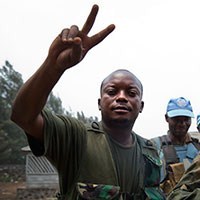Tuesday’s news of the defeat of the M23 rebel group by the Democratic Republic of Congo’s (DRC) national army forces was a rare bright spot for those who follow the country’s fortunes. Until this week, the Congolese army, known by its French acronym FARDC, had not achieved a decisive military victory against any nonstate armed group in its history. The nominal national forces were better known as a ragtag amalgamation of soldiers from former militant groups who as often as not engaged in gross human rights violations against the civilians they were charged with protecting. In battle, FARDC forces typically ran away from the front when faced with a challenge, often breaking ranks and going on looting and raping sprees in whatever city or village was unfortunate enough to be in their path.
That changed this week for a variety of reasons, among them the DRC government’s commitment to using more professional forces and commanders, and strong support from the new Force Intervention Brigade (FIB) deployed by the United Nations’ DRC peacekeeping mission, known by its acronym Monusco. Rwanda, which has long backed various armed movements operating in the DRC, also decided not to intervene on M23’s side, in large part due to intense diplomatic pressure and the suspension of U.S. military aid following the release of U.N. reports last year detailing Kigali’s support for the group. Congolese are rightly proud of this monumental victory, and President Joseph Kabila’s government has wasted no time in touting its newfound military might.
M23’s defeat does not mean there is now peace in the eastern DRC, however. Though they were perhaps the most visible of the region’s armed groups, due largely to the fact that they operated close to the major city of Goma and thus were easy to report on in a day trip, between 30 and 40 other armed groups still operate in the region with impunity. Most of the two Kivu provinces, much of Ituri district and some areas of northern Katanga remain outside the central government’s scope of meaningful control. Kinshasa is incapable of providing the most basic services like electricity, running water, effective criminal justice, proper health care and quality education to the vast majority of its citizens. Much remains to be done if the Congo is to escape from the past two decades of violence.

